» posted on Monday, September 30th, 2013 by Linda Lou Burton
Hardy As A Rock
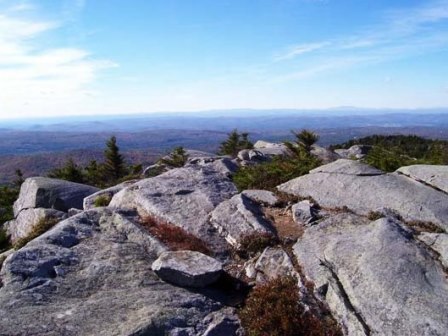 Linda Burton posting from Concord, New Hampshire – New Hampshire is the Granite State. So called, it is said, due to its extensive granite formations and quarries. But I don’t think that’s the only reason. Consider the state motto, proudly displayed on the state coin and every license plate: Live Free Or Die. Such is not the motto of the wishy-washy, or the faint of heart. New Hampshire isn’t very big – 190 miles from top to bottom and no more than 68 miles wide, ranked 46th among the states in area. New Hampshire doesn’t have a lot of people – a little over 1.3 million, ranked 42nd among the states in population. But New
Linda Burton posting from Concord, New Hampshire – New Hampshire is the Granite State. So called, it is said, due to its extensive granite formations and quarries. But I don’t think that’s the only reason. Consider the state motto, proudly displayed on the state coin and every license plate: Live Free Or Die. Such is not the motto of the wishy-washy, or the faint of heart. New Hampshire isn’t very big – 190 miles from top to bottom and no more than 68 miles wide, ranked 46th among the states in area. New Hampshire doesn’t have a lot of people – a little over 1.3 million, ranked 42nd among the states in population. But New 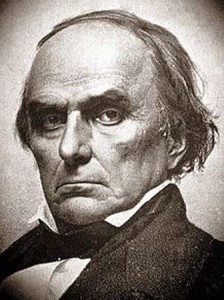 Hampshire was the first of the colonies to break away from Great Britain (January 1776); six months later it became one of the original thirteen states and the first to have its own state constitution. Look at some of the outspoken and daring people who have come out of New Hampshire: orator and statesman Daniel Webster (right, 1782-1852); reformer and newspaper editor Horace Greeley (1811-1872); Christian Science founder Mary Baker Eddy (1821-1910); the first American in space, astronaut Alan Shepard (1923-1998); author of the bestselling and controversial Da Vinci Code, Dan Brown (b 1964). These are not people who coasted along on the Status Quo. They had their opinions, and they acted on them. In fact, the opinion of everyone in New Hampshire
Hampshire was the first of the colonies to break away from Great Britain (January 1776); six months later it became one of the original thirteen states and the first to have its own state constitution. Look at some of the outspoken and daring people who have come out of New Hampshire: orator and statesman Daniel Webster (right, 1782-1852); reformer and newspaper editor Horace Greeley (1811-1872); Christian Science founder Mary Baker Eddy (1821-1910); the first American in space, astronaut Alan Shepard (1923-1998); author of the bestselling and controversial Da Vinci Code, Dan Brown (b 1964). These are not people who coasted along on the Status Quo. They had their opinions, and they acted on them. In fact, the opinion of everyone in New Hampshire 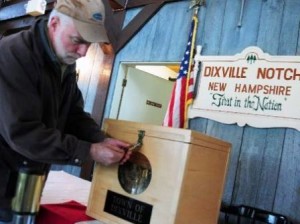 takes the national spotlight on a recurring basis – with both the New Hampshire primary, and the casting of the first votes in the Presidential election. Only a few delegates are chosen in the New Hampshire primary, but it often changes the face of national politics. Along with the first caucus in Iowa, it is a major testing ground for all party candidates, garnering massive media attention. And then, there’s Dixville Notch.
takes the national spotlight on a recurring basis – with both the New Hampshire primary, and the casting of the first votes in the Presidential election. Only a few delegates are chosen in the New Hampshire primary, but it often changes the face of national politics. Along with the first caucus in Iowa, it is a major testing ground for all party candidates, garnering massive media attention. And then, there’s Dixville Notch.
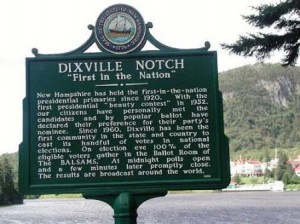 Dixville Notch is famous for its first-in-the-nation vote in the presidential election. Through rain, sleet or snow, all eligible voters gather on election eve in the ballroom of the Balsams Hotel. In the first minute of election day, they cast their vote and then officially close the polls; results are broadcast around the country immediately. The vote count doesn’t take long – the population of Dixville Notch was only 12 in the 2010 US Census. But the responsibility is taken seriously, and the world tunes in; what are the folks of New Hampshire thinking? How will they vote? (Since 1960, Dixville Notch voters have gone for 8 of the 13 presidents elected; the 2012 vote was an equal split between Obama/Romney.)
Dixville Notch is famous for its first-in-the-nation vote in the presidential election. Through rain, sleet or snow, all eligible voters gather on election eve in the ballroom of the Balsams Hotel. In the first minute of election day, they cast their vote and then officially close the polls; results are broadcast around the country immediately. The vote count doesn’t take long – the population of Dixville Notch was only 12 in the 2010 US Census. But the responsibility is taken seriously, and the world tunes in; what are the folks of New Hampshire thinking? How will they vote? (Since 1960, Dixville Notch voters have gone for 8 of the 13 presidents elected; the 2012 vote was an equal split between Obama/Romney.)
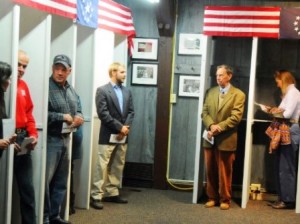 Although most New Hampshire polling stations open around sunrise and close in the early evening like the rest of the country, Dixville Notch takes advantage of a state law that allows a precinct to close if all registered voters in that precinct have cast ballots. So all registered voters in Dixville Notch gather and are counted before the balloting takes place. The “Ballot Room” of the Balsams Hotel serves as the polling place; this room features a separate voting booth for each citizen. Neil Tillotson (1898-2001) gets credit for starting this tradition; he wanted to be the first voter in the land so he’d hold his ballot over the box while
Although most New Hampshire polling stations open around sunrise and close in the early evening like the rest of the country, Dixville Notch takes advantage of a state law that allows a precinct to close if all registered voters in that precinct have cast ballots. So all registered voters in Dixville Notch gather and are counted before the balloting takes place. The “Ballot Room” of the Balsams Hotel serves as the polling place; this room features a separate voting booth for each citizen. Neil Tillotson (1898-2001) gets credit for starting this tradition; he wanted to be the first voter in the land so he’d hold his ballot over the box while 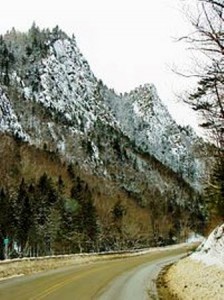 looking at his watch. At the stroke of midnight, he’d drop his ballot; then the rest of the town’s voters would follow suit. Since his death (at the age of 102), Dixville Notch’s first voter is chosen randomly beforehand.
looking at his watch. At the stroke of midnight, he’d drop his ballot; then the rest of the town’s voters would follow suit. Since his death (at the age of 102), Dixville Notch’s first voter is chosen randomly beforehand.
Dixville Notch lies in the northernmost county of New Hampshire, where a little chunk of the state juts up into Canada. Vermont and the Connecticut River are twelve miles to the west; Maine and the Androscoggin River about fifteen miles to the east; the Canadian border is no more than twenty miles away. It gets its name from the 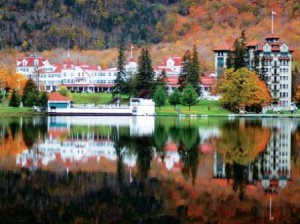 actual “notch” (mountain pass) between 3,482-foot Dixville Peak and Sanguinary Mountain. Situated at elevation 1,887 feet and surrounded by The Balsams Wilderness, the Balsams Grand Resort Hotel creates a dramatic mountain scene alongside a 15,000-acre lake. People come to the Balsams to play golf in the summer and to ski in the winter. And to vote, on election day. Quite a tradition, wouldn’t you say?
actual “notch” (mountain pass) between 3,482-foot Dixville Peak and Sanguinary Mountain. Situated at elevation 1,887 feet and surrounded by The Balsams Wilderness, the Balsams Grand Resort Hotel creates a dramatic mountain scene alongside a 15,000-acre lake. People come to the Balsams to play golf in the summer and to ski in the winter. And to vote, on election day. Quite a tradition, wouldn’t you say?
So what are the stories of Concord, capital city of this hardy state? Concord, with a population of 42,695 (US Census 2010) lies 150 miles to the south of Dixville Notch in a 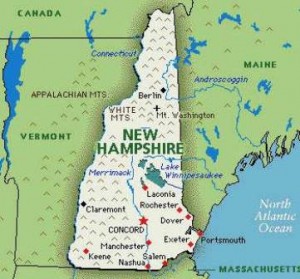 more heavily populated area; it’s only 70 miles more to Boston. Thousands of years ago this area on the Merrimack River was home to the Abenaki; members of the Pennacook tribe fished here for migrating salmon with nets strung across
more heavily populated area; it’s only 70 miles more to Boston. Thousands of years ago this area on the Merrimack River was home to the Abenaki; members of the Pennacook tribe fished here for migrating salmon with nets strung across 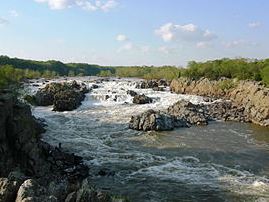 the rapids. The river was the transportation route for their birch bark canoes, allowing passage to Lake Winnipesaukee and to the Atlantic Ocean; the river valley was good for growing beans, and squash, and maize; it was an idyllic lifestyle.
the rapids. The river was the transportation route for their birch bark canoes, allowing passage to Lake Winnipesaukee and to the Atlantic Ocean; the river valley was good for growing beans, and squash, and maize; it was an idyllic lifestyle.
In 1725 Captain Ebenezer Eastman and others from Massachusetts came to settle here; the Province of Massachusetts Bay claimed territories west of the Merrimack and granted the Concord area as the “Plantation of Penacook.” It was renamed “Concord” in 1765 following a bitter boundary dispute between two towns that had evolved; the name was meant to reflect the new concord, or harmony, between the towns. New Hampshire was admitted to the Union as 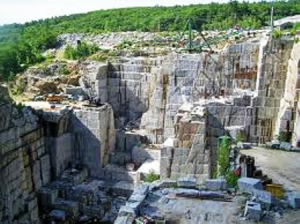 the 9th state June 21, 1788, and Concord seemed the logical choice for the state capital; the current State House has been in use since 1819. Besides being the seat of state government, the city became known for furniture-making, and for granite quarrying.
the 9th state June 21, 1788, and Concord seemed the logical choice for the state capital; the current State House has been in use since 1819. Besides being the seat of state government, the city became known for furniture-making, and for granite quarrying.
The Granite State. Yes, New Hampshire’s bedrock is mostly granite; its density is the result of millennia of compression deep in the earth’s crust. From the first years of European settlement, it has made good use of this precious resource. At one time small quarries were common in the southern parts of the state; today only larger sites are cost effective. Although granite outcroppings are visible from roads and fields, commercial granite must be cut from solid deposits underground, where the effects of wind and ice have not damaged the stone.
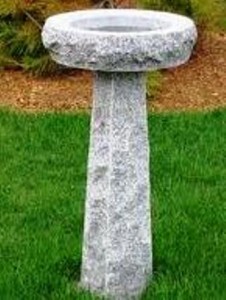 The largest quarry in New Hampshire today is in the center of Rattlesnake Hill, just outside Concord. It is Swenson Granite Company, established in 1883 and today headed by the fifth generation of the Swenson family. The Concord quarry produces about 25,000 tons of granite annually; at the present rate, there is an almost inexhaustible supply. In Swenson’s retail store you can buy simple items such as a
The largest quarry in New Hampshire today is in the center of Rattlesnake Hill, just outside Concord. It is Swenson Granite Company, established in 1883 and today headed by the fifth generation of the Swenson family. The Concord quarry produces about 25,000 tons of granite annually; at the present rate, there is an almost inexhaustible supply. In Swenson’s retail store you can buy simple items such as a 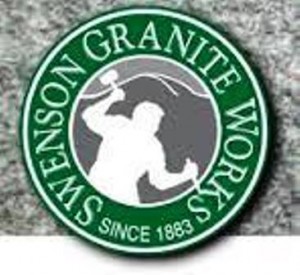 granite bench, or a bird bath, but the quarry’s mainstay is street curbing; it cuts about 330,000 linear feet a year. And New Hampshire granite can be found in monumental buildings all over the world; one of the most notable is the Library of Congress in Washington, DC; it was built from over 30,000 tons of New Hampshire granite.
granite bench, or a bird bath, but the quarry’s mainstay is street curbing; it cuts about 330,000 linear feet a year. And New Hampshire granite can be found in monumental buildings all over the world; one of the most notable is the Library of Congress in Washington, DC; it was built from over 30,000 tons of New Hampshire granite.
There’s one more thing I’ll mention today about Concord, and New Hampshire’s impact on the world, and that’s the Concord Monitor. This daily newspaper has been published continuously since 1864; names and owners have changed but today it is flagship of the Newspapers of New England chain. It has been recognized as one of the best small papers in America many times; Time magazine named it simply “one of America’s best.” In 2008 photographer Preston Gannaway won the Pulitzer Prize for her feature photography. Former Monitor staff who also have been awarded a Pulitzer are Jo Becker, now of the New York  Times, and Steven Pearlstein, now of the Washington Post. As of June 2013, Mark Travis is publisher and editor of the Concord Monitor.
Times, and Steven Pearlstein, now of the Washington Post. As of June 2013, Mark Travis is publisher and editor of the Concord Monitor.
There’s more to be said about this granite state, and about its people and their rock hardy way of life; stay tuned.
Dixville Notch http://www.greatnorthwoods.org/dixvillenotch/
Swenson Granite http://www.swensongranite.com/
Concord Monitor http://www.concordmonitor.com/home/
